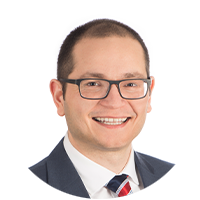Sotirios Nedios, MD, FHRS, CEPS-A, CCDS | Global Clinical Scholars Research Training

As an experienced cardiac electrophysiologist and an expert in the treatment of cardiac arrhythmias, Sotirios Nedios, MD, FHRS, CEPS-A, CCDS is also a skilled physician scientist. As the author of more than forty papers published in the scientific literature, he is accustomed to bridging his research interests with hands-on medical practice. So when the opportunity arose for him to join the Global Clinical Scholars Research Training (GCSRT) program, Dr. Nedios applied for the program which ran from June 2019 through September 2020.
After finishing medical school in Greece, Nedios furthered his medical training in Germany and the United States, ultimately moving back to Germany where he currently practices at the University of Leipzig Heart Center, one of the largest heart centers in Europe. All the while, he published in key journals related to electrophysiology.
“I had a lot of experience with publications and statistics, and I knew that I would have an academic career involving high-quality clinical trials,” Dr. Nedios recalls. When he learned of the GCSRT Program, he expected it would be an enriching experience adding to his already rich understanding of clinical scholarly research.
Excellence in Teamwork
“It actually exceeded my expectations by far,” he says. Apart from the curriculum, which he regards as excellent, the program also focused on highly-successful teamwork; creating a space of psychological safety, committing on common goals, resolving conflict, and holding each other accountable, to get the best results. He learned that teams can perform better than individuals; that caring personally and challenging directly helps teams perform better.
Dr. Nedios had something to compare GCSRT to having previously completed a diploma of advanced studies in cardiac arrhythmia management (DAS-CAM), a European-based course, where he had the opportunity to learn about leadership, collaboration, and change management. Inspired by this and armed with the knowledge of the GCSRT program, Dr. Nedios was able to apply new skills within a group of medical experts from around Europe and the globe. “It was a very diverse team, and I immediately realized how much better we performed when we worked together on a project,” he says.
Capstone Project Focuses on a Clinical Research Question
To complete the program, Dr. Nedios and colleagues were challenged with a capstone project. It all started with a single premise—the clinical research question. Each participant was charged with identifying important elements of the research question and then designing a way to answer it. The project had to be feasible, interesting, novel, ethical, and relevant; something that would make a difference in the world.
“The capstone project took us down the whole process of designing a rigorous clinical trial and writing a grant to be submitted to potential funding organizations,” he says. “Throughout the program we were instructed in all the steps needed and given practical tools to get funding, which is the cornerstone of every academic career.”
Nedios’ project followed his experience as a cardiac arrhythmia specialist. His clinical trial was designed around a type of heart arrhythmia called typical atrial flutter. The goal is to improve treatment of patients with this condition and to prevent the risk of more serious heart problems including stroke.
“We are entering the era of precision medicine. Medicine is going to be more personalized with decisions about treatment tailored to the characteristics of each person,” he says. “All of that is based on doing the right clinical trials.” At the end of Dr. Nedios’ trial, he hopes to be able to develop a risk model for every patient with atrial flutter to predict their stroke risk. “Hopefully, this will help us intervene more appropriately and save some patients from stroke.”
Networking and Communication Skills
Dr. Nedios’ participation in GCSRT has also made him a better reviewer of other people’s papers and clinical research projects. “I thought I knew statistics since I have published many papers of my own, but I took a very deep dive in statistics and learned so much more,” he says. “Afterwards, I was more thorough with the peer review of papers and have been able to provide more thoughtful recommendations for the work of my team and my peers.”
He was also pleasantly surprised by the instruction in presentation and networking skills within the program. “We all need communication skills in everything we do in life, but especially in clinical research, you have to be careful about pitching your idea. It can be the difference between getting funded or not,” he says. “As physicians, we are used to developing some empathy communication skills in settings with patients, but we have not really been trained in communicating research ideas and negotiating with all the different stakeholders. In GCSRT you get more than interpersonal skills, you learn charisma and transform your presence in the room. It opens new doors that otherwise would not have been possible.”
Enacting a Legacy Project
Happily, Dr. Nedios’ project has become more than a graduation requirement. He has already applied for funding for the trial with several funding institutions in Germany.
“This kind of opportunity to conduct a multi-year clinical trial like this happens maybe once or twice in a career,” says Dr. Nedios. “I am so fortunate to have taken GCSRT and learned how to best design and hopefully complete this trial. It’s what I would like my contribution to this field to be.”
Learn more about Global Clinical Scholars Research Training.
Written by Alice McCarthy